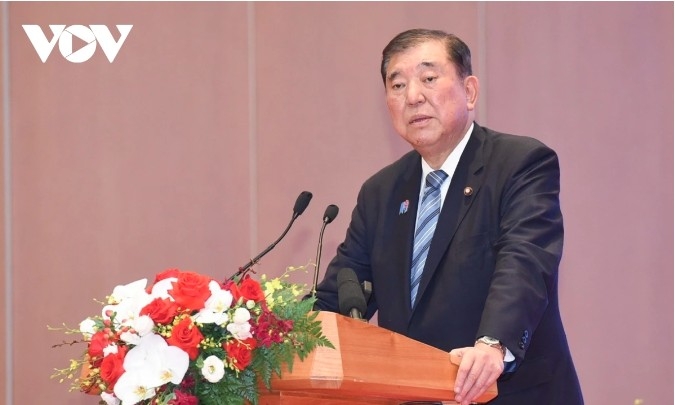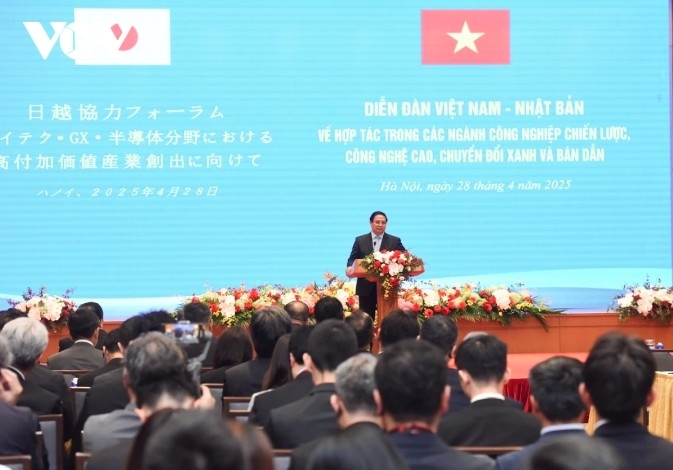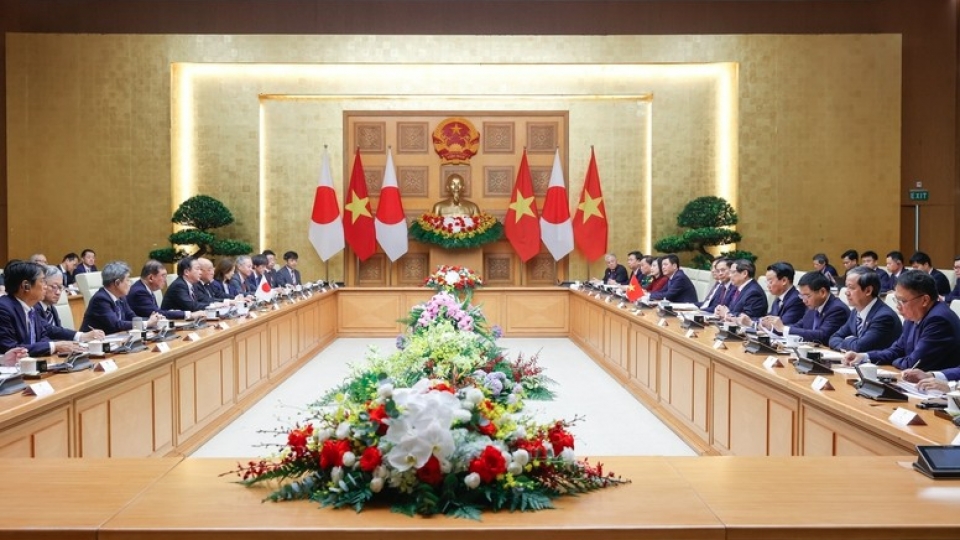Vietnam, Japan look to stronger cooperation in strategic industries
VOV.VN - Prime Minister Pham Minh Chinh and his Japanese counterpart Ishiba Shigeru jointly attended the Vietnam-Japan Forum on cooperation in strategic industries, high-tech, green transition, and semiconductors on April 28 in Hanoi.
Those in attendance at the event included leaders from ministries, agencies, and government bodies of both countries, as well as over 300 delegates representing Vietnam-Japan businesses and universities.
In its national development strategy, Vietnam identifies science, technology, innovation, digital transformation, and green transition as key growth drivers, essential for realizing the ambition for rapid and sustainable development.
Vietnam is actively carrying out comprehensive policies to support the development of strategic industries such as artificial intelligence, semiconductors, big data, clean energy, green technologies, and digital infrastructure. The goal is for the digital economy to account for at least 30% of GDP by 2030 and for Vietnam to rank among the top 40 countries globally in innovation. Vietnam is committed to achieving net-zero emissions by 2050.
Japan remains a special, strategic, and reliable partner for Vietnam, with over US$78 billion in FDI and a longstanding position as Vietnam's largest ODA donor. Japan has made considerable contributions to modernizing infrastructure, transferring technology, developing human resources, and enhancing Vietnam's industrial capabilities, especially in processing, manufacturing, and high-tech sectors.
At the forum, business representatives from both countries, including Tokuyama Group, Tromso Group, Panasonic Group, and NIPRO Group from Japan, as well as FPT Group, T&T Group, and CMC Technology Group from Vietnam, discussed and shared insights on cooperation in strategic sectors. They also introduced collaborative initiatives and models, with businesses from both sides signing partnership agreements aimed at creating an innovation ecosystem and high-tech industry collaboration between Vietnam and Japan.
Truong Gia Binh, Chairman of FPT Group, shared the company’s aspiration for expanding cooperation between the two governments. FPT has partnered with leading Japanese companies such as Restar Group, NISSO Group, and MRIV Company. Under these agreements, Japan will support semiconductor workforce development for Vietnam, while Vietnam will provide transportation sector human resources for the East Asian nation.

Nguyen Thi Thanh Binh, Deputy General Director of T&T Group, affirmed that T&T will continue to lead the way with Japanese partners, turning the governments' policy directions into concrete projects that bring practical results. She also called for further facilitation from both governments for the private sector to play a greater role in the green energy transition.
In his speech, PM Ishiba Shigeru highlighted Japan's expansion of manufacturing into Vietnam in the 1990s, which played a key role in the country's economic growth. He emphasized that with its 100 million people and abundant, skilled workforce, Vietnam is truly a promising investment destination.
During his visit to the Thang Long Industrial Park, PM Ishiba noted the strong cooperation between Japanese and Vietnamese businesses. He stressed that amid global economic uncertainty, the collaboration between Japan and Vietnam, two countries with tightly integrated supply chains, offers a substantial opportunity to spur industrial development.
Japan pledges to help Vietnam increase its resilience to external shocks through public-private sector collaboration, including workforce training and carbon emission reduction, aligning with the “New Era” approach outlined by Party General Secretary To Lam.
PM Ishiba hailed Vietnam's focus on high-value industries to drive industrialization and modernization alongside administrative reforms. Japan is preparing to launch a semiconductor engineering training program at Vietnam-Japan University, receive about 250 PhD students in the semiconductor field–half of Vietnam's national strategic target, and strengthen the exchange of new-generation talent in advanced science and technology sectors.
Japan will also assist in building a multi-crystal silicon production facility and accelerating the decarbonization process at industrial parks in Vietnam. Japan is working with the National Innovation Center (NIC) to connect startups with leading businesses from both countries, and initial results have been promising.

In terms of carbon reduction and energy cooperation, Japan and Vietnam are jointly implementing projects such as offshore wind power, electricity transmission networks, and biomass energy. Japan aims to continue boost deeper cooperation between the public and private sectors to further strengthen bilateral ties for the benefit of both nations.
PM Pham Minh Chinh affirmed the form as a vivid demonstration of the comprehensive strategic partnership between Vietnam and Japan, which has been cultivated over 50 years and is now entering a new phase of development with strategic trust, long-term vision, and renewed momentum.
The world is facing unprecedented challenges in geopolitics, trade, climate change, supply chain disruptions, and global production shifts. In this context, Vietnam and Japan must play a pioneering role in high-tech, innovation, digital transformation, green transition, and semiconductor industries, he stressed.
Recalling the strong ties between the two countries, especially since the elevation of their relationship to a Comprehensive Strategic Partnership nearly two years ago, PM Pham Minh Chinh highlighted Vietnam's development strategy, which places people at its center, with science, technology, and innovation as its key drivers, and international cooperation as a breakthrough.
Currently, Vietnam is implementing a “quadruple strategy” that includes breakthroughs in science, technology, innovation, and national digital transformation; reorganizing the political system and administrative units; developing the private sector; and deeper international integration.
On this foundation, Vietnam is committed to building an innovation ecosystem, improving institutions, developing infrastructure, enhancing human resources, and improving the investment and business environment–aiming for a green, inclusive, and sustainable economy.
The Vietnamese cabinet leader also reiterated Vietnam's commitment to ensuring the role of foreign-invested sectors in its economy, protecting investors' rights, maintaining political stability, and fostering a favorable environment for investment.
He urged Japan to continue supporting Vietnam through development cooperation programs, especially in strategic sectors such as high-tech industries, digital transformation, green transition, and innovation.
Chinh also encouraged Japanese companies to expand their investments in Vietnam, contributing to the country's competitiveness and deeper integration into global value chains.
The Prime Minister expressed his confidence that, with the high political determination of both countries’ leaders, along with the cooperation of businesses and international organizations, with the spirit of "sincerity, affection, trust, and mutual benefit," the two sides will realize strategic directions on high-tech industry development, green transition, and semiconductors, opening a new chapter of comprehensive and inclusive growth in Vietnam-Japan cooperation. This will contribute to the fast and sustainable development of everyone, every business, and strengthen the deep, practical, and effective cooperation between the two countries, contributing to the development of the Asia-Pacific region as well as the wider world.





